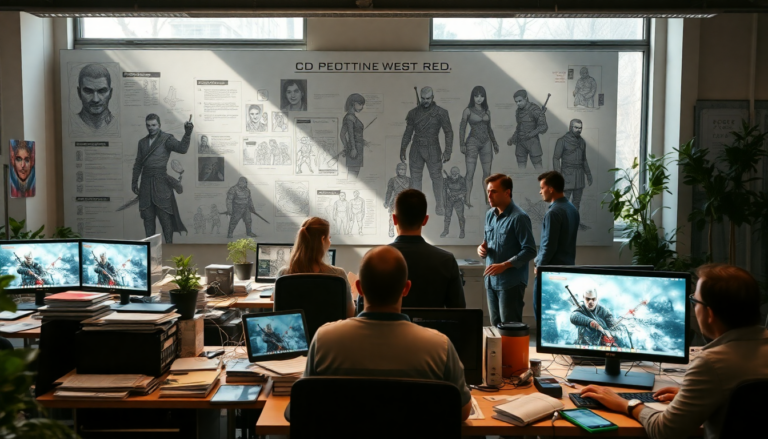Argomenti trattati
CD Projekt Red’s trajectory in the gaming industry is a captivating tale of ambition, evolution, and the harsh realities of creative aspirations. Once regarded as the underdog, this Polish studio has transformed into a formidable force, largely thanks to its flagship franchise, The Witcher. The Witcher 3: Wild Hunt, in particular, marked a watershed moment, elevating both the studio’s reputation and the expectations surrounding game development.
The Witcher series: A remarkable journey
The Witcher games exemplify a remarkable evolution in quality and complexity. The series began with a rather rough debut, which, let’s be honest, was more of a trial run than a polished product. However, it laid the groundwork for what was to come. The Witcher 2: Assassins of Kings showed significant improvement, capturing the interest of gamers with its engaging narrative and character development. Yet, it was The Witcher 3 that truly revolutionized the landscape, becoming a benchmark for RPGs everywhere.
Its success was not merely about sales figures; it reshaped how CD Projekt Red viewed its capabilities. Michał Nowakowski, the joint CEO, shared insights about the weight of expectations that followed the success of The Witcher 3. He vividly remembers the anxiety surrounding the launch of Dragon Age: Inquisition, a competitor that set high standards. “We can really go toe to toe with the big boys,” he recalls thinking, showcasing a newfound confidence that emerged from the game’s success.
A double-edged sword: Confidence and overreach
With great success comes great responsibility—or perhaps, a little overconfidence. Nowakowski acknowledges that the triumph of The Witcher 3 instilled a belief that the studio could always deliver magic, a notion that, in hindsight, might have led to some miscalculations. This ‘magical thinking’ notion is reminiscent of the legendary BioWare magic, where developers hoped for last-minute fixes to save troubled projects. It’s a phenomenon many have experienced; I remember waiting anxiously for my favorite game to come together at the eleventh hour, hoping against hope that the developers would work some kind of miracle.
However, as we all know, magic doesn’t always happen. The ambitious development of Cyberpunk 2077 highlighted the risks of this mindset. As the studio expanded, components were often developed in isolation, resulting in a game that felt disjointed. “It was a bit of chaos,” Nowakowski admits, reflecting on the lessons learned from the tumultuous journey of Cyberpunk.
Learning from the past: Towards a more cohesive future
After the launch of Cyberpunk 2077, CD Projekt Red embraced a new direction. The studio recognized the need to dismantle the silos that had formed, fostering a more integrated development process. Nowakowski emphasizes that while chaos was present, there was also significant planning and great producers steering the ship. But it was the realization that those processes needed refinement that marked a turning point for the company.
It’s like any creative endeavor—lessons are often learned the hard way. In my own experiences, I’ve found that collaboration often leads to breakthroughs, while isolation can stifle creativity. And that’s precisely what CD Projekt Red is now striving for: a harmonious blend of ambition and responsibility in game development.
Shifting from underdog to industry leader
Transitioning from being the scrappy underdog to an industry leader is no easy feat. The studio has significantly increased its budget, investing $81 million in The Witcher 3 and a staggering $320 million for Cyberpunk 2077’s launch version. This shift in scale necessitates a different approach, one that acknowledges the complexities of managing large-scale projects while maintaining the creative spark that initially fueled their success.
Michał Platkow-Gilewski, VP of PR and communication, reflects on the challenges that come with this transformation. “It was cool to be the underdog,” he remarks, recognizing the allure of that position, which often comes with a sense of freedom and rebellion. Yet, as the stakes rise, so too do the expectations for quality and execution. In the end, it’s a balancing act—finding a way to retain the spirit of innovation while adhering to the rigors of the industry.
The future of The Witcher series
As CD Projekt Red celebrates the legacy of The Witcher series, eyes are also set on what lies ahead. The upcoming titles promise to build upon the foundation laid by its predecessors while addressing the lessons learned from past experiences. The anticipation surrounding The Witcher 4 is palpable, with many hoping for a return to the intricate storytelling and richly woven worlds that defined the original games.
In my view, this next chapter holds immense potential. As the gaming landscape continues to evolve, so too does the opportunity for CD Projekt Red to innovate and surprise its audience once again. After all, great storytelling never goes out of style.
Final thoughts
Reflecting on CD Projekt Red’s journey, it’s clear that the evolution of this studio mirrors the trials and triumphs of the gaming industry itself. From the early days of The Witcher to the monumental success of The Witcher 3 and the challenges faced with Cyberpunk 2077, each step has shaped the company into what it is today. As we look forward to the future, one can’t help but feel a mix of excitement and cautious optimism. Will they rise to the occasion once more? Only time will tell.

